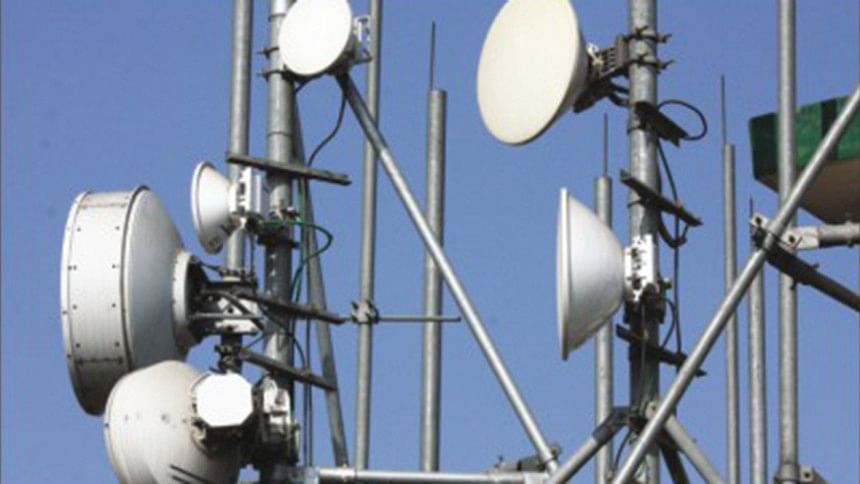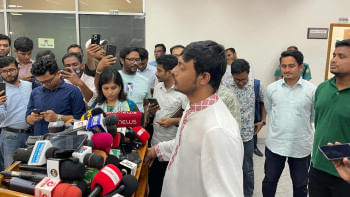Mobile service during disasters: No contingency system despite available funds

The telecom ministry has failed to establish a National Emergency Telecommunication System (NETS) to maintain telecommunication and internet services during disasters despite starting the initiative almost two years ago.
In September 2022, following a devastating flood in Sylhet that rendered most of the mobile towers nonfunctional, the Posts and Telecommunications Ministry formed a 12-member committee to develop NETS.
The committee was tasked with formulating a specific plan for NETS, including technical aspects, management and maintenance of the system.
However, the ministry has yet to furnish any plan. Moreover, some organisations listed as committee members are unaware of the committee's existence.
"As far as we know, we haven't been invited to the committee in the last two years -- such a system is very essential to ensure smooth communication during the different types of natural disasters," said Bangladesh Red Crescent Society, which was named as a member of the committee.
Every time a cyclone, flood, or other natural disaster strikes Bangladesh, affected individuals first lose access to mobile networks when they need connectivity the most to seek help.
This disruption is primarily due to extended power outages: the standard battery backup duration for base transceiver stations ranges from four to eight hours.
After September 2022, when the initiative was taken, Bangladesh faced a number of cyclones and floods that severely disrupted telecommunication. If an emergency system had been in place, people's suffering from lack of communication would have been much less.
For instance, Cyclone Mocha in May 2023 knocked down most of the towers in Cox's Bazar, while Cyclone Remal in May left more than 55 percent of the mobile towers dysfunctional.
Were the NETS in place, the government would not have needed to spend about Tk 50 lakh to provide diesel to keep network towers operational in flood-affected areas in Feni at present.
The posts and telecommunication secretary was the convener of the committee and the director general of the Bangladesh Telecommunication Regulatory Commission's systems and services division was assigned as the member secretary.
The Director General of the Department of Disaster Management (DDM) was also made a member of the committee.
Razwanur Rahman, the DDM DG, told The Daily Star he has not been made aware of such an initiative.
Md Mushfiqur Rahman, secretary for Posts and Telecommunications, could not be reached for comment. However, a senior official in the ministry said the initiative hasn't progressed much.
The committee was also supposed to present a budget proposal for the NETS in the social obligation fund (SoF) council meeting.
SoF of the BTRC is a fund designed to support the expansion of telecommunication services in underserved areas. And the major contributors to the SoF are telecom operators.
But no such proposal has been placed at the meeting of the SOF council in the last two years, according to the meeting minutes.
At the meeting of the SoF council in April this year, which took place after one and half years of the formation of the committee, a project for NETS was proposed.
But in the next meeting, in late July, there was no mention of the project.
The meeting discussed the projected cost of Tk 835 crore for different projects in fiscal 2024-25. However, the NETS was not included in the list of projects, according to the document.
"The prolonged delay in implementing the NETS is a critical oversight, especially when the SoF is readily available," said Abu Nazam M Tanveer Hossain, a telecom policy expert.
Given Bangladesh's vulnerability to natural calamities, a national telecommunications emergency plan (NETP) and system are essential for coordinating relief efforts and saving lives, he said.
Immediate action is needed prioritising high-risk areas, network neutrality and tailored contingency plans for different emergencies.
"This will enhance our disaster response and safeguard our citizens effectively," he said, adding that the International Telecommunication Union's Strategic Target 3.5 mandates that all countries have a National Emergency Telecommunication Plan by 2023.
The International Telecommunication Union (ITU) is a specialised agency of the UN responsible for many matters related to information and communication technologies.
The ITU provided a deadline to the respective national telecommunication operators to come up with a detailed NETP by 2023, said Shahed Alam, chief corporate and regulatory officer at Robi.
The NETP is an overall document that includes not only the regulatory framework for disaster risk management but also all activities and actions that need to be developed and implemented in each of the phases of the disaster management cycle beyond the ICT sector.
In the case of any global pandemic or any other natural calamities, NETP plays a pivotal role in dealing with specific crises for a country.
Against this backdrop, the BTRC arranged a workshop with relevant stakeholders for developing a NETP for Bangladesh, according to Alam.
"Unfortunately, no effective measures have been implemented yet based on the recommendations that came up from the workshop. We believe that immediate implementation of NETP will pave the way for smoothly implementing the NETS."

 For all latest news, follow The Daily Star's Google News channel.
For all latest news, follow The Daily Star's Google News channel. 



Comments